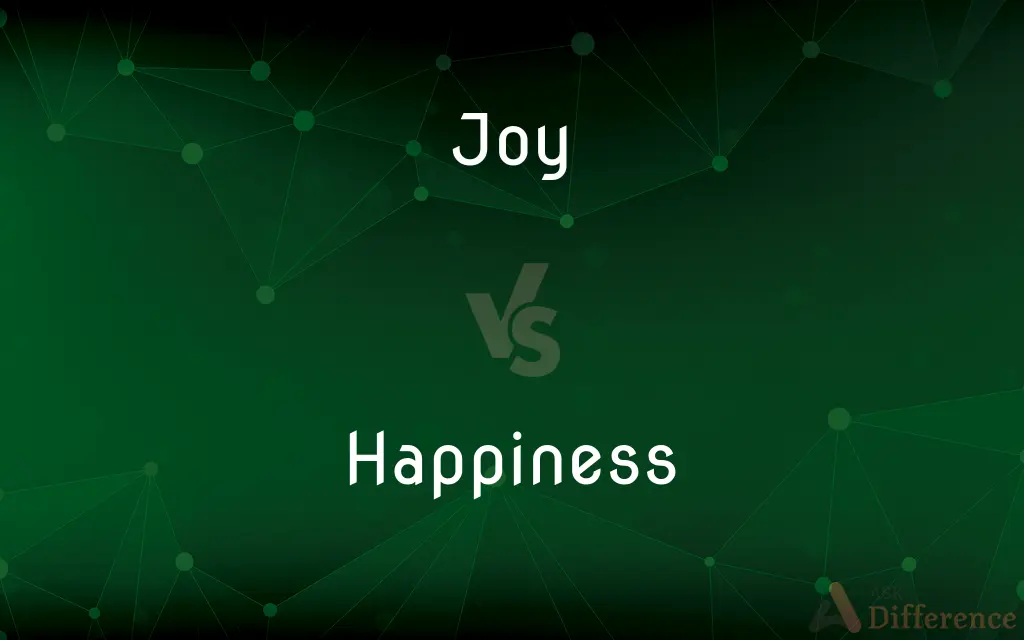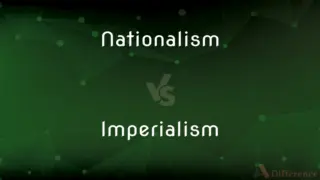Joy vs. Happiness — What's the Difference?
By Maham Liaqat & Fiza Rafique — Updated on April 14, 2024
Joy is a deep, often spontaneous feeling of contentment and spiritual connection, while happiness generally refers to a state of well-being or pleasure derived from external circumstances.

Difference Between Joy and Happiness
Table of Contents
ADVERTISEMENT
Key Differences
Joy often emerges from inner fulfillment or spiritual experiences, making it more profound and lasting. Whereas happiness typically arises from positive external events or conditions, making it subject to change as circumstances fluctuate.
Joy is considered less dependent on external factors, often being described as a state of peace and contentment that is internal and self-sustaining. On the other hand, happiness is usually more influenced by external conditions like success, relationships, and comfort.
Individuals might experience joy even in challenging times due to a deep sense of meaning or faith. In contrast, happiness tends to diminish when faced with adversity or dissatisfaction in life’s aspects like career or personal relationships.
The expression of joy can be more internal and less visible, often associated with a sense of enlightenment or spiritual awakening. Whereas happiness is frequently expressed outwardly and can be easily observed through behaviors like smiling or laughter.
Joy connects deeply with one’s life purpose and values, often bringing a sense of alignment with one’s deeper self. Happiness, however, is often related to satisfying desires or achieving goals, which might not necessarily align with one's deeper values.
ADVERTISEMENT
Comparison Chart
Source
Internal fulfillment and spiritual experiences
External circumstances and achievements
Dependence
Less dependent on external factors
Highly dependent on external conditions
Expression
Internal, often subtle
Outwardly visible, e.g., smiling, laughter
Stability
More enduring and constant
Variable, often fleeting
Associated with
Spiritual connections, inner peace
Achievements, pleasures, life satisfaction
Compare with Definitions
Joy
A profound state of happiness and contentment.
She felt a deep joy watching the sunrise.
Happiness
Pleasurable satisfaction with life or the current situation.
They found happiness in their new home.
Joy
Emotional elation at a spiritual or deep level.
His heart was filled with joy during the meditation retreat.
Happiness
An emotion resulting from achievements or positive life circumstances.
Her happiness was evident after her promotion.
Joy
The emotion experienced when one is spiritually or emotionally fulfilled.
Volunteering at the shelter brought her true joy.
Happiness
A feeling of pleasure or contentment.
His smile was a clear sign of his happiness.
Joy
The feeling arising from well-being or good fortune.
The joy of receiving good news was overwhelming.
Happiness
The state of being happy, often from external causes.
Winning the lottery brought him instant happiness.
Joy
A lasting sense of inner peace and satisfaction.
Despite his hardships, he lived a life full of joy.
Happiness
The experience of joy or pleasure.
The party was full of laughter and happiness.
Joy
The word joy means a feeling of great pleasure and happiness.
Happiness
The term happiness is used in the context of mental or emotional states, including positive or pleasant emotions ranging from contentment to intense joy. It is also used in the context of life satisfaction, subjective well-being, eudaimonia, flourishing and well-being.Since the 1960s, happiness research has been conducted in a wide variety of scientific disciplines, including gerontology, social psychology and positive psychology, clinical and medical research and happiness economics.
Joy
Intense and especially ecstatic or exultant happiness, or an instance of such feeling.
Happiness
Enjoying, showing, or marked by pleasure, satisfaction, or joy
A happy child.
The happiest day of my life.
Joy
An expression of such feeling.
Happiness
Cheerful; willing
Happy to help.
Joy
A source or an object of joy
Their only child, their pride and joy.
Happiness
Characterized by good luck
A happy sequence of events.
Joy
To take great pleasure; rejoice.
Happiness
Being especially well-adapted; felicitous
A happy turn of phrase.
Joy
To fill with ecstatic happiness, pleasure, or satisfaction.
Happiness
Characterized by a spontaneous or obsessive inclination to use something. Often used in combination
Trigger-happy.
Joy
To enjoy.
Happiness
Enthusiastic about or involved with to a disproportionate degree. Often used in combination
Money-happy.
Clothes-happy.
Joy
A feeling of extreme happiness or cheerfulness, especially related to the acquisition or expectation of something good.
A child's joy on Christmas morning
They will be a source of strength and joy in your life.
Happiness
(uncountable) The emotion of being happy; joy.
Joy
Anything that causes such a feeling.
The joys and demands of parenthood
Happiness
Prosperity, thriving, wellbeing.
Joy
Luck or success; a positive outcome.
Happiness
Good luck; good fortune.
Joy
(obsolete) The sign or exhibition of joy; gaiety; merriment; festivity.
Happiness
Fortuitous elegance; unstudied grace; — used especially of language.
Joy
(intransitive) To feel joy, to rejoice.
Happiness
Good luck; good fortune; prosperity.
All happiness bechance to thee in Milan!
Joy
To enjoy.
Happiness
An agreeable feeling or condition of the soul arising from good fortune or propitious happening of any kind; the possession of those circumstances or that state of being which is attended with enjoyment; the state of being happy; contentment; joyful satisfaction; felicity; blessedness.
Joy
To give joy to; to congratulate.
Happiness
Fortuitous elegance; unstudied grace; - used especially of language.
Some beauties yet no precepts can declare,For there's a happiness, as well as care.
O happiness! our being's end and aim!
Others in virtue place felicity,But virtue joined with riches and long life;In corporal pleasures he, and careless ease.
His overthrow heaped happiness upon him;For then, and not till then, he felt himself,And found the blessedness of being little.
Joy
To gladden; to make joyful; to exhilarate.
Happiness
State of well-being characterized by emotions ranging from contentment to intense joy
Joy
The passion or emotion excited by the acquisition or expectation of good; pleasurable feelings or emotions caused by success, good fortune, and the like, or by a rational prospect of possessing what we love or desire; gladness; exhilaration of spirits; delight.
Her heavenly form beheld, all wished her joy.
Glides the smooth current of domestic joy.
Who, for the joy that was set before him, endured the cross, despising the shame.
Tears of true joy for his return.
Joy is a delight of the mind, from the consideration of the present or assured approaching possession of a good.
Happiness
Emotions experienced when in a state of well-being
Joy
That which causes joy or happiness.
For ye are our glory and joy.
A thing of beauty is a joy forever.
Joy
The sign or exhibition of joy; gayety; mirth; merriment; festivity.
Such joy made Una, when her knight she found.
The roofs with joy resound.
Joy
To rejoice; to be glad; to delight; to exult.
I will joy in the God of my salvation.
In whose sight all things joy.
Joy
To give joy to; to congratulate.
To joy the friend, or grapple with the foe.
Joy
To gladden; to make joyful; to exhilarate.
Neither pleasure's art can joy my spirits.
Joy
To enjoy.
Who might have lived and joyed immortal bliss.
Joy
The emotion of great happiness
Joy
Something or someone that provides pleasure; a source of happiness;
A joy to behold
The pleasure of his company
The new car is a delight
Joy
Feel happiness or joy
Joy
Make glad or happy
Common Curiosities
What is the primary difference between joy and happiness?
Joy is a deep, often spiritual or internal state, whereas happiness is more influenced by external conditions.
How do life events affect joy and happiness differently?
Life events can significantly boost happiness when they are positive, but negative events may decrease happiness. Joy, on the other hand, is less susceptible to changing circumstances and can be sustained even during difficult times due to its deeper roots.
Is happiness more fleeting than joy?
Generally, yes, happiness is often dependent on external circumstances and can be more fleeting compared to the enduring nature of joy.
How can one cultivate joy?
Joy can be cultivated through spiritual practices, self-reflection, and aligning one’s life with personal values and purposes.
Can joy exist without happiness?
Yes, joy can exist independently of external happiness, as it is rooted in deeper spiritual or emotional states.
Does happiness lead to joy?
While happiness can contribute to joy, they are fundamentally different and happiness alone does not necessarily lead to joy.
What role do relationships play in experiencing joy and happiness?
Relationships can greatly enhance both joy and happiness. Joyful relationships are often characterized by deeper emotional connections and shared values, while relationships that foster happiness might focus more on mutual interests and positive experiences.
Are joy and happiness culturally interpreted in the same way around the world?
Cultural interpretations can vary significantly. In some cultures, happiness is closely tied to social harmony and community success, whereas joy might be seen in more individual or spiritual contexts. Cultural values shape how both emotions are understood and prioritized.
Can people control their levels of happiness and joy?
While external circumstances heavily influence happiness, people have some control over it through their reactions and mindset. Joy is more about an inner state that can be cultivated through practices like mindfulness, gratitude, and spiritual living.
Is joy or happiness more important for mental health?
Both are important, but consistent joy contributes to a deeper, more stable sense of well-being and resilience, potentially offering greater benefits for long-term mental health.
Share Your Discovery

Previous Comparison
Loonie vs. Toonie
Next Comparison
Nationalism vs. ImperialismAuthor Spotlight
Written by
Maham LiaqatCo-written by
Fiza RafiqueFiza Rafique is a skilled content writer at AskDifference.com, where she meticulously refines and enhances written pieces. Drawing from her vast editorial expertise, Fiza ensures clarity, accuracy, and precision in every article. Passionate about language, she continually seeks to elevate the quality of content for readers worldwide.















































